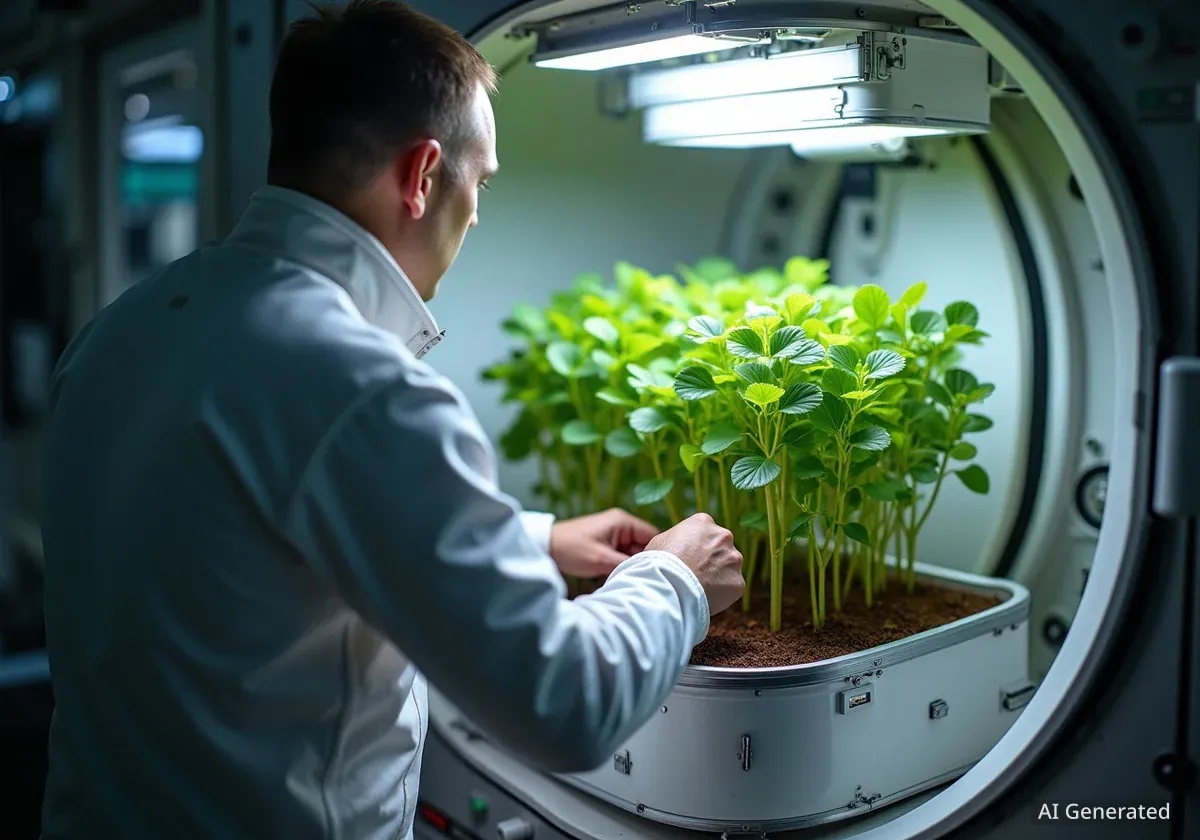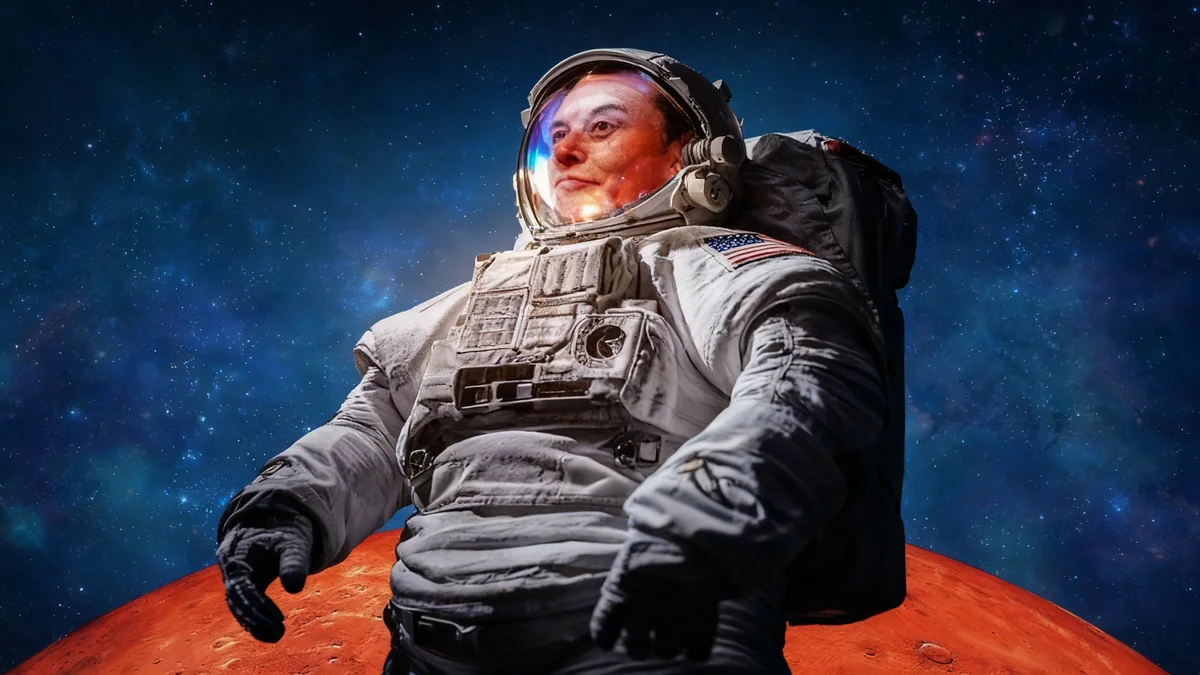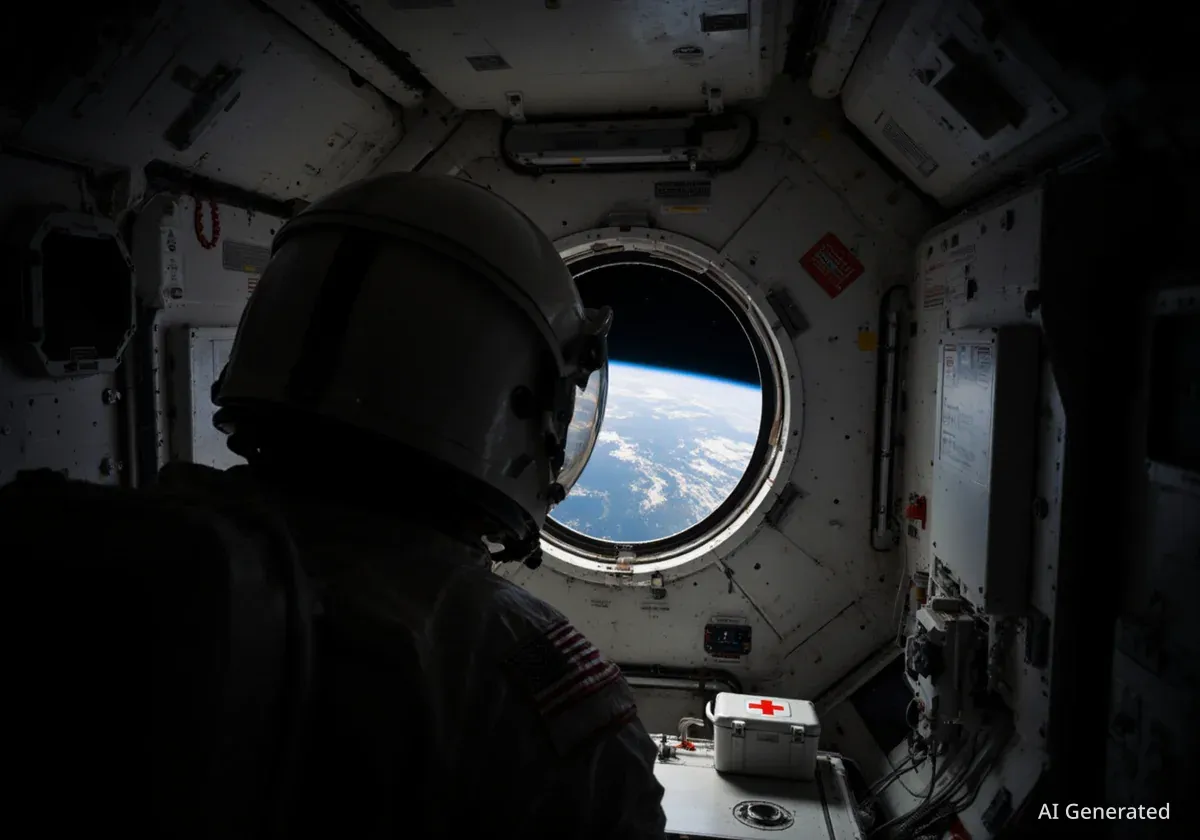A new study reveals that growing and eating fresh plants aboard the International Space Station (ISS) provides significant psychological and sensory benefits to astronauts. The research, which followed 27 crew members on long-duration missions, confirms that space farming is more than just a source of nutrition; it's a vital tool for maintaining mental health in the isolated environment of space.
Astronauts reported that tasks like tending to, viewing, and consuming fresh produce were enjoyable, meaningful, and stimulating. These activities helped reduce stress and provided a much-needed connection to Earth, suggesting that gardens will be a critical component for future missions to the Moon and Mars.
Key Takeaways
- A study of 27 ISS astronauts confirmed that growing plants in space has significant behavioral health benefits.
- Consuming and voluntarily viewing the plants were rated as the most enjoyable and beneficial activities.
- Interacting with plants improved mood, wellbeing, and provided positive sensory stimulation (smell, sight, taste).
- Female astronauts reported greater benefits in wellbeing, crew relationships, and connection to Earth.
- The findings support using space farming as a countermeasure against the psychological stress of long-duration spaceflight.
A Touch of Earth in the Void
For astronauts living and working hundreds of miles above Earth, the environment is one of sterile, mechanical efficiency. The absence of natural sights, smells, and tastes can take a psychological toll over months. A recent study has provided the first quantitative evidence that cultivating small gardens in space acts as a powerful antidote to this monotony.
Researchers surveyed 27 astronauts who participated in crop growth experiments using NASA's Vegetable Production System (Veggie) and Advanced Plant Habitat (APH). The findings were overwhelmingly positive. Crew members described the experience of working with plants as engaging and meaningful, offering a welcome break from routine technical tasks.
One astronaut's comment captured the sentiment perfectly: "When you’re inside, even leaning back, you still smell Earth. And we don’t have those smells at all. It’s very sterile, very mechanical. So, to be able to lean my head in and smell those moist plants and life is hugely beneficial."
The Challenge of Deep Space Travel
As humanity plans for missions to Mars, which could last up to three years, maintaining crew psychological health is a primary concern. Astronauts will face extreme isolation, communication delays of up to 22 minutes each way, and a monotonous environment. Finding sustainable, onboard methods to support mental wellbeing, known as countermeasures, is essential for mission success.
The Most and Least Enjoyable Tasks
The study broke down the process of space farming into specific tasks to understand which aspects were most beneficial. The results showed a clear pattern in what astronauts valued most.
Harvest and Consumption Reign Supreme
The activities with the highest positive impact were directly related to the reward of the harvest. The two most enjoyable tasks were:
- Consuming the crops: Eating fresh, crisp vegetables after months of pre-packaged meals was a powerful morale booster.
- Voluntary viewing: Simply taking time to look at the green, living plants provided a consistent source of pleasure and stress relief.
Engaging in these two activities was directly linked to enhanced mood, improved wellbeing, and a stronger desire to eat the fresh produce. The sensory experience—the sight of green leaves, the smell of fresh soil, and the taste of the harvest—was found to become increasingly pleasant over the duration of a mission.
By the Numbers: Space Farming
- 27 astronauts participated in the study.
- Crew members spent an average of 6.17 hours per month on crop-related tasks.
- Consuming and viewing plants consistently ranked highest for enjoyment.
- The least enjoyable task was cleaning up the hardware and sanitizing produce.
The Necessary Chores
While tasks like watering, thinning seedlings, and harvesting were also rated highly, one activity stood out as the least enjoyable: clean up. This included sanitizing the produce with wipes before consumption and cleaning the growth hardware after an experiment. Researchers noted that this time-consuming, less rewarding task could be optimized in future system designs to maximize the time astronauts spend on more beneficial activities.
Not Just a Feeling: Measurable Psychological Gains
The study went beyond simple enjoyment ratings, linking plant interaction to concrete behavioral health outcomes. Astronauts who spent time viewing or eating the crops reported that the experience enhanced their mood and overall sense of wellbeing. The positive effects appeared to be consistent over time, with no decline in benefits even on missions lasting up to a year.
"Keep it going!! The crew will do as many of these as you set up," one crew member commented in their post-mission survey, highlighting the demand for more gardening opportunities.
Interestingly, the study also found differences based on gender. Female astronauts reported that interacting with the plants had a stronger positive effect on their wellbeing, their relationships with fellow crew members, and their feeling of connection to Earth compared to their male counterparts. While the sample size of female astronauts was small, it suggests an area for further research.
Coping with Failure
Space farming is not without its challenges. The study also documented astronauts' reactions when plants struggled or died. Rather than causing significant distress, the response was generally mild. Most astronauts expressed disappointment but also a desire to understand what went wrong and work with ground experts to improve their technique. This indicates a resilience and problem-solving mindset, turning potential setbacks into learning opportunities.
Implications for the Future of Space Exploration
The results of this study have significant implications for designing future habitats for the Moon and Mars. Providing astronauts with larger, more accessible, and visually appealing garden systems could be a low-cost, high-impact way to support their mental health.
By staggering crop cycles, mission planners can ensure a continuous supply of fresh food and a constant source of positive psychological stimulation. Optimizing systems to reduce unenjoyable tasks like cleaning will further enhance the benefits. As one astronaut noted, the goal is to "move beyond the experiment" and truly engage in operational farming.
Ultimately, a small patch of green in the cold expanse of space offers more than just vitamins. It provides a tangible link to home, a sensory escape from a machine-dominated world, and a simple, profound reminder of life on Earth.





